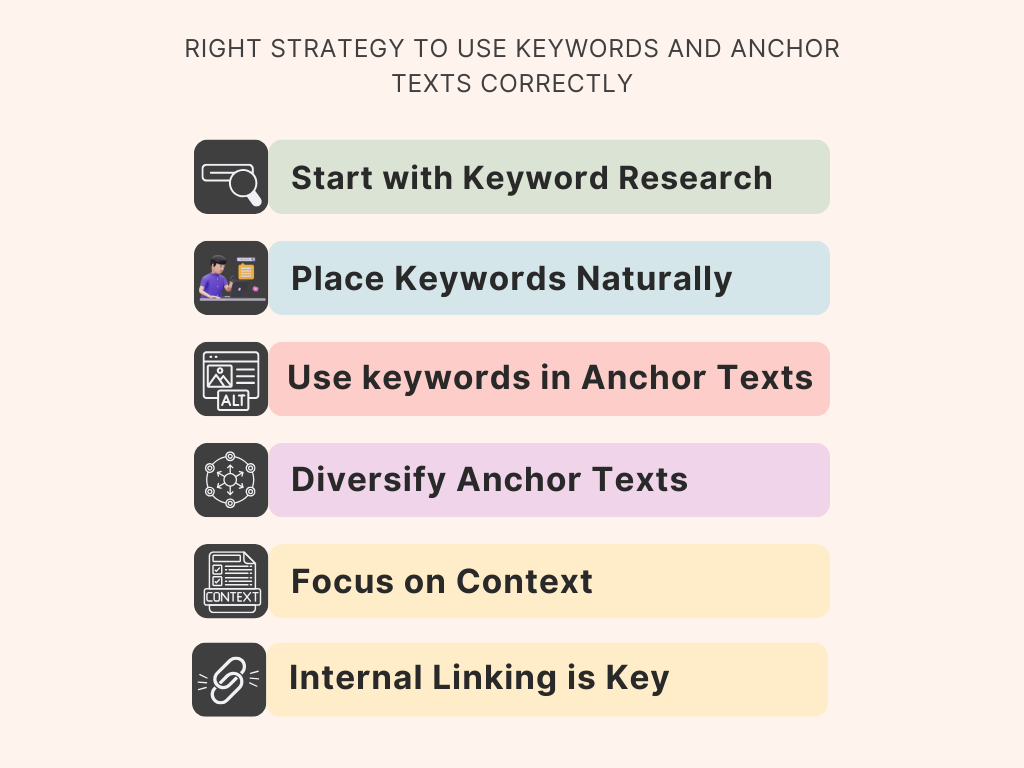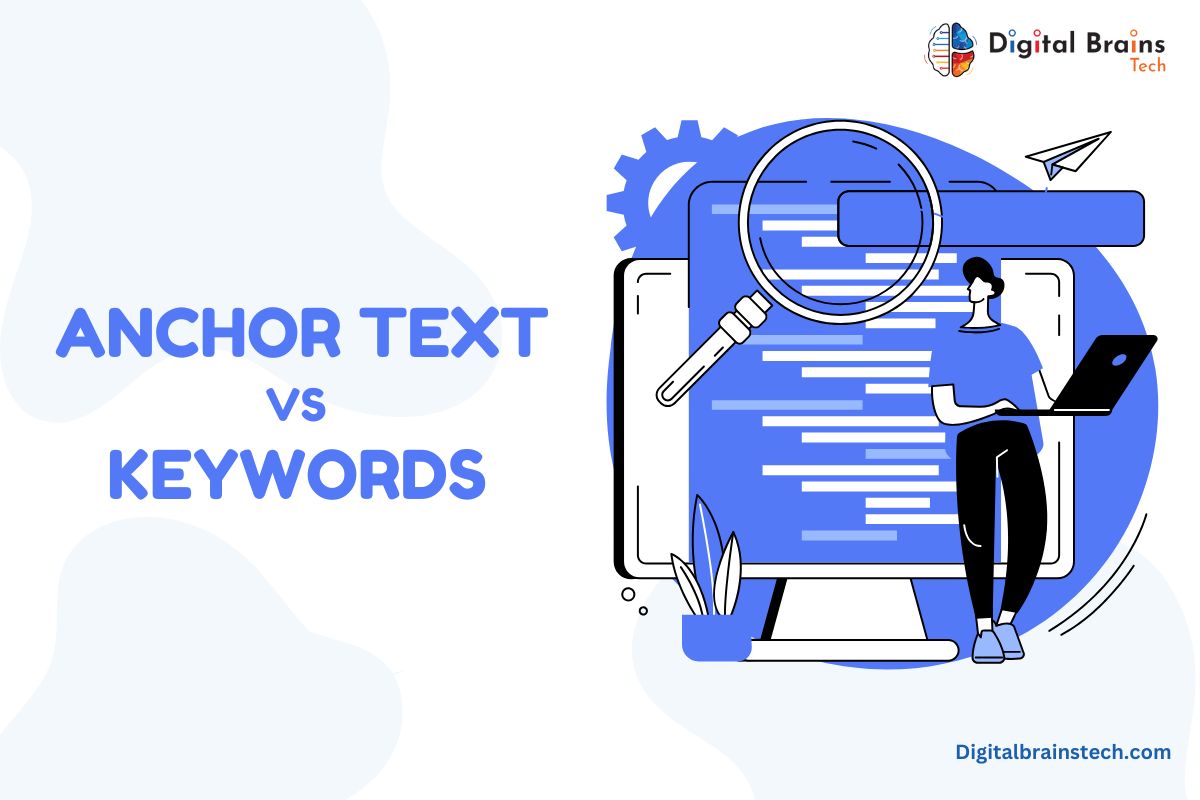Think about the last time you Googled something, and typed “the best professional seo services provider in the USA.” This is a search term that led you to the desired content, indicating it is a keyword. Now, you have reached a blog stating the best services of a company. There, you read the clickable text “Check out our top performing clients.” It is an anchor text.
Keywords and anchor text both play a vital role in how content is found among a number of competitors. In this blog, you will learn the key differences between keywords and anchor texts, their respective importance, and how to turn them into your SEO power.
What are Keywords?
Keywords are the target search queries and phrases that are typed into a search engine to find information. For example, “How to get the best sleep” or “What is the best digital marketing strategy for 2025?” “Meditation center near me.”
These terms or queries help the search engines to understand the user’s requirements. For one topic, there are hundreds of keywords possible. The respective search volume of the keyword defines its difficulty level for ranking. SEO experts carry out keyword research to determine which keywords are to be targeted in content.
Significance of Keywords for SEO
Keywords lay the foundation of SEO. They understand user behaviour and build content to actually help the user. Keywords matter for the following reasons-
- Drive relevant traffic
- Match User Intent
- Boost your site’s visibility in search results.
- Help you target what your audience is searching for
- Improve content relevance.
What are Anchor Texts?
Also referred to as link text, anchor text is a visible and clickable text that users can click on to navigate to another webpage. An anchor text is a hyperlink that, when clicked, directs the user to a different page or website.
For example, ‘Learn more about our link-building services.’
Here, the link-building service is the anchor text.
Difference Between Keywords vs Anchor Text
Keywords and anchor text play an equally important role in SEO. The key difference between keywords and anchor text is given below in the table:
| Feature | Keywords | Anchor Texts |
| Definition | Search phrases used to target content | The clickable text in a hyperlink |
| Purpose | To help rank for relevant search queries | To guide users and bots to other pages |
| Placement | Used throughout page content, meta tags, and headers | Used specifically in hyperlinks |
| SEO Function | Improves visibility in search results | Influences link value and relevance |
| User Role | Helps users find relevant content | Improves navigation and context |
Why is Anchor Text Important for SEO Success?
Anchor text is vital to improving a website’s SEO and overall success. This text on the website guides visitors regarding the website’s content to the required information. The reader gets to know what they can expect from the mentioned content, it gives them a direction.
Additionally, one major mistake that many executives make is neglecting the importance of anchor text. They take it lightly and don’t put their mind and attention towards building effective ones. But it is necessary to understand that not only the anchor text but also the surrounding words are equally important. The sentence or the CTA should be engaging and creative enough to catch the viewer’s attention. Most importantly, the anchor text should be relevant to the original content and relate to reputable pages.
| Anchor Text Type | Definition | Examples | Key Characteristics |
| Exact Match | Exactly matches the target keyword or phrase. | “Professional seo services” or “link building services” | -No extra words-High SEO value, but risky if overused |
| Partial Match | Consists of the target keyword and other related words. | “How to find the best seo service providers in USA” “Safe, clean storage units in USA” | – More natural than an exact match-Helps avoid keyword stuffing-Includes variations |
| Branded | Uses the brand name as the clickable link text. | “Digital Brains Tech”, “Apple | – Builds brand authority-Safe and effective for SEO-Often used for homepages or about pages |
| Naked URL | The full website address is used as the anchor text. | https://digitalbrainstech.com/ | -Simple and clear-Less likely to be flagged as spam-Not very user-friendly |
| Generic (Random) | Non-descriptive text like “Read more” or “Click here” with no keywords. | “Visit our website.” “Click here”, “See more”, | -Easy to overuse-Provides no SEO context-Must be supported by strong surrounding text |
Take a look at how do we have used keywords in this blog.
Why are Keywords Important for SEO Success?
Connection Between Keywords and Search Engines: Keywords make things better, meet the needs of the reader. Also, marketers can aim their content with the help of keywords. With the right keywords and high-quality content, you can signal to search engines that your website is a good match. It helps to improve the chances of ranking on SERP.
Understanding User Intent: Keyword analysis is done after understanding the purpose behind a search. It not only helps to find the right keywords, the intent of the user and covers.
Enhance Organic Traffic Engagement: Drive traffic and ensure to attract visitors to engage with the content. It leads to lower bounce rates, longer time on page, and better SEO results.
Read The Ultimate Keyword Research Checklist
Few Common Mistakes to Avoid
During the initial days of our digital marketing journey, making mistakes is natural. But attaining the ample amount of information and experience from proficients help to minimise the risks. The experts have shared their experience concisely in the form of avoiding a few mistakes as mentioned below-
Avoid Penalties: Never stuff anchor texts with the exact-match keywords.
Repeated Use: It looks unnatural to use the same anchor text repeatedly.
Ignoring Internal Linking Opportunities: If you miss the chance of internal linking then you are missing a chance to improve rankings and structure.
Right Strategy to Use Keywords and Anchor Texts Correctly

The correct combination and usage of keywords and anchor texts attract search engines and build link authority. These strengthen the SEO performance when used ethically and naturally. Take a look-
- Place keywords naturally
- Use keywords in anchor texts, such as use partial anchor text to keep it diverse, and exact match for occasionally important blogs.
- Diversify anchor texts such as mix generic anchor texts, branded and naked URL, along with keyword-rich ones.
- Focus on context, and ensure the content near the anchor text should be valuable and relevant.
- Internal linking is key so, link to other relevant pages using anchor text.
Tip: Don’t overuse exact matches to avoid triggering spam filters.
Final Thoughts: Use The Two Wisely
If you want your content to be ranked on a search engine, then you must know the strategy to include both of them wisely. The balanced use of keywords and anchor texts in the blog then you’ld get clicks, and build trust. So, no matter what type of content you are writing, the targeted keywords should guide the topics covered. Use keyword research tools, analyse your competitors or hire the best professional seo services provider in the USA to drive more traffic to your website. Using keywords organically in on-page SEO elements helps search engines better understand the relevance of your content, but search engines are pretty smart. They know when they’re being spammed. So, the natural use of keywords and anchor text is important.




